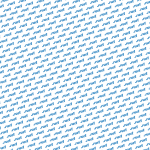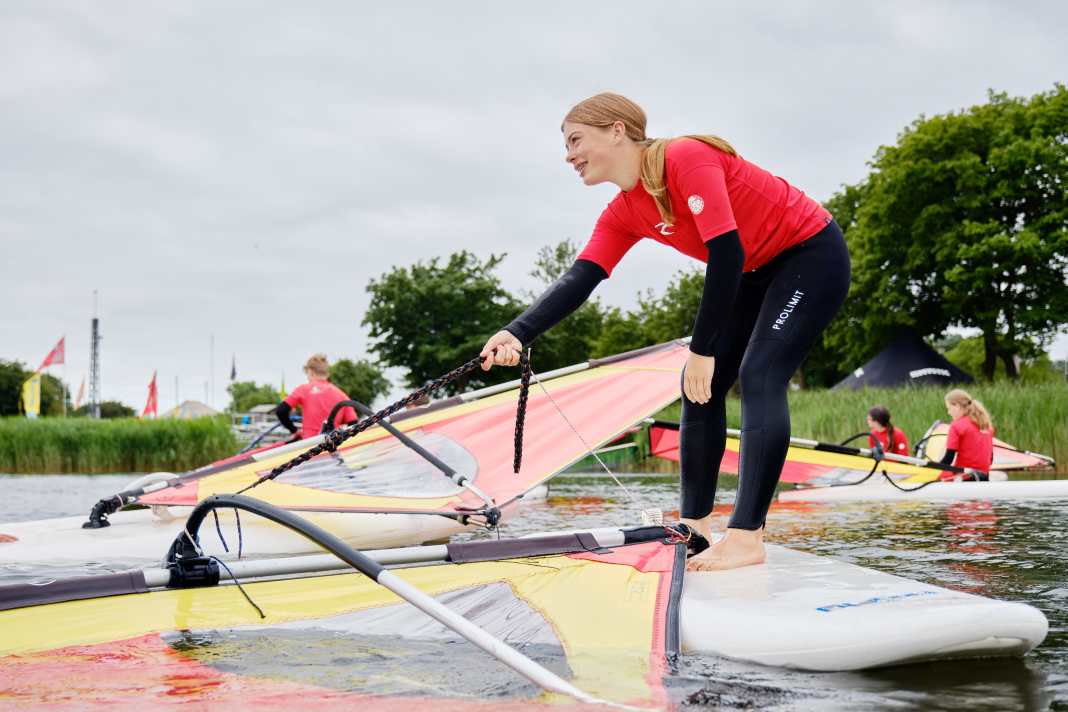





The beaches on the island of Rügen are among the most popular with windsurfing tourists, but locals are rarely seen on the water. A water sports school in the far north wants to make up for this: it offers a week of surfing holidays - just for children from the island.
The long holidays started a few days ago. The summer is still long and promising, and school is just a fuzzy memory for a few weeks. Today, 35 children aged between 11 and 18 are starting their surf camp: seven days without parents, seven days with two surfing lessons a day. Seven evenings with a rally and campfire and (almost) no mobile phones. Some already know each other, many are meeting for the first time today. Shouting and splashing, laughing and shouting: Jana tries to hold on to her wobbly board among many other children. Her red bodysuit identifies her as a beginner. After a few falls, she finally manages it: she keeps her balance for a few seconds, then falls backwards into the water, her eyes wide open. Ben is 13 and so thin that he can easily squeeze into the tight wetsuit. He can already surf a little, but he is still excited and cracks one joke after another. Jehor doesn't listen. He sits alone in the shade under a low tree and looks as if he is not interested in the others. He stares motionlessly at the reeds.
Overcoming boundaries while surfing
The 15-year-old Jehor is taking part for the third time. He was youth champion in standard dance in the Ukraine and has not found a dance school on Rügen. Perhaps that's why he dances with such virtuosity on his board on the water - he's already surfing with the best in his second year. But he doesn't have a friend here. He says that he doesn't find it easy to meet new people. Three years ago, he fled Ukraine with his mother and twin sister, who is also taking part in the camp. They arrived in March and three months later, in July, they were here on the boards for the first time.
While Jana, Ben, Jehor and the others are in the water with their sails and boards, Sarah Miron is sitting at a table in front of the surf school, sorting receipts. She has organised the camp and is tense. Will everything go well? Will what she has planned work? A surf camp as an instrument to break down differences, to overcome invisible boundaries? Borders between children whose parents are public prosecutors or teachers and those from Rotensee, a prefabricated housing estate in Bergen, the capital of Rügen, where Ben also lives.
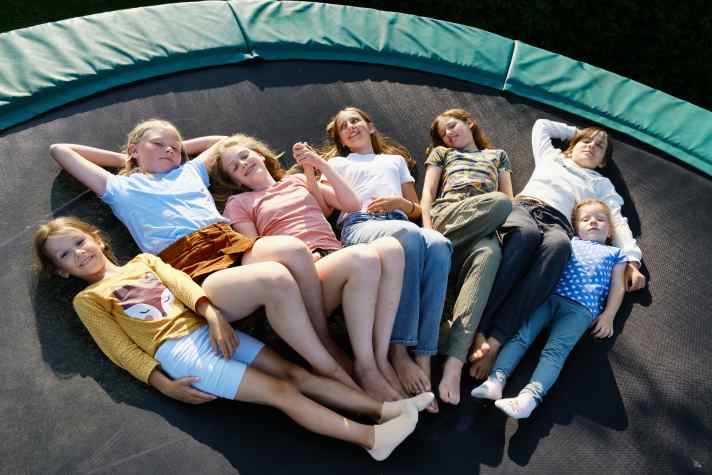
"Sometimes I have doubts as to whether we're reaching the right people," says Sarah Miron. She has advertised the camp everywhere, in the city gazettes, in all the schools. "If we don't specifically approach individual children, get in touch with their parents, keep asking, then in the end only those who go on holiday with their parents for three weeks after the one week come to the surf camp." And that's not because of money, because their camp is subsidised. But for children whose parents can't get out of bed in the morning, a surf camp is simply not an attractive proposition. Because they know that their younger siblings won't go to daycare without them.
"My husband and I have been lucky in life," says Sarah Miron, "I would like to pass some of that on. It makes me happy when I can contribute to making others happy. And the best way to do that is with the things that I can do and that I enjoy. So with sport." At the regional school where her husband is head teacher, they organise half of the afternoon programme themselves. And for them, water sports are like their own personal way of creating a little balance.
Windsurfing combines identity, coolness and nonchalance
Riding the waves on boards, kitesurfing, surfing: These are sports that offer young people identity, coolness and nonchalance in the complicated years between primary school and driving licence. A sense of belonging, an alternative to right-wing rock, drugs and alcohol at the bus stop. But on Rügen, surfing is only for tourists. Yet there are around ten water sports schools on the island. But you won't find island kids there.
Both Mirons work as teachers and originally come from Fulda in Hesse, where they successfully organised ski camps. Sport and the commitment surrounding it was their life. Because two of their four children suffer from severe allergies, the doctors advised them to move to the coast. "It was clear to us that if we moved to the sea, we would switch completely to water sports," says Sarah Miron - surfboards instead of skis. When the family came to Rügen eight years ago, they asked around among their new pupils: But none of them had any connection to water sports. And they couldn't find a water sports club at first.
At some point, the Mirons finally came across the "Rügen Pirates" water sports school in Dranske, in the north-west of the island. It was founded in 2005 by surf instructors from the Ruhr area, and from the very beginning these pirates saw themselves as part of the village community. They didn't want to be "the others" and taught children and young people from the neighbourhood to surf for free. They gave jobs in the school to people from Dransk, and the local community has been organising the summer festival together with the surf school for years. Dranske's mayor, Lothar Kuhn, says: "The water sports school is a huge asset, both economically and in terms of the voluntary programmes for the children and young people on the island." The village needs the school. But the school also needs the village.
Surf pirates as swimming instructors
The school is prominently located on Dransk harbour, right next to the pier and next to the "Dronte Bar", a bistro where you can eat and drink with a view of the Bodden and the colourful sails in the sky during the season. The school and bar form a kind of double centre that always comes alive in the summer months. Then the water sports school is a bit of everything: Youth club and shop, community centre and even swimming school. Some children from Dranske can only swim at all because of the "Rügen Pirates": Because the nearby swimming centre no longer offered swimming lessons, a learn-to-swim group for the island's children was set up there in 2023.
Water sports are always a lifestyle too. You can hire and buy surfing equipment, bracelets and casual T-shirts in the shop. Antifa stickers are stuck on the lockers where the surfers lock up their clothes, and a few kids stand around the table football table in the centre of the room and high-five each other after every goal. In the evening, the pirates and their guests sit around the fire together.
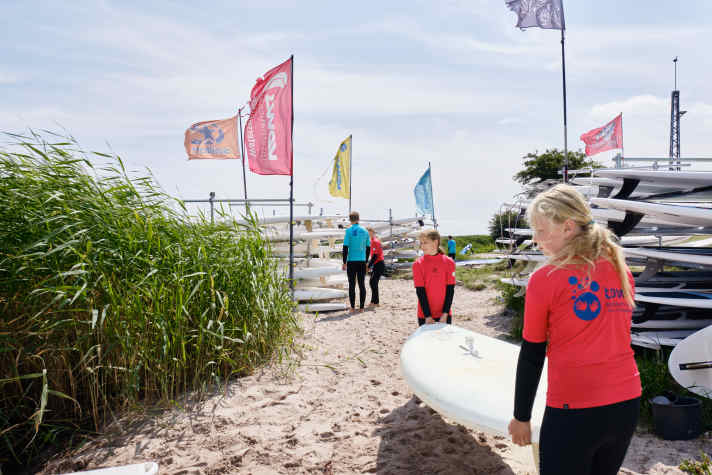
Andreas Schmidt has been a surf instructor here for years. He looks after the advanced surfers at the surf camp. "As a teenager, I wanted to be a surf instructor, and now I'm fulfilling that dream during the summer holidays," he says. The rest of the time, he works as a German and general studies teacher at a neighbourhood school in Berlin-Neukölln. "I like being part of the surf school community with the Pirates. For me, it's a social sport where you're out in nature together and have fun," he says. "Here at the Pirates, the original surfing spirit is still alive." Unfortunately, surfing is far too much about who has the best equipment. Sails and boards cost a lot of money, and if you want to be at the forefront, you have to keep investing in new equipment.
Some children from Danske can only swim at all because of the "Rügen Pirates": Because the nearby indoor swimming pool no longer offered swimming lessons, a learn-to-swim group for the island children was set up there in 2023.
Surfing for all
"The fact that we came across the 'Rügen Pirates' was a wonderful coincidence," says Sarah Miron. "We had very similar ideas about getting people on the island of Rügen interested in water sports." She and her husband were among the first members of the "tow" (touch on water) association, which the Pirates founded in 2019. In addition to the annual summer camp for the children of Rügen, the association also offers surfing with young people with alcohol and drug addictions and SUP camps for wheelchair users. Surfing for everyone who would otherwise not find their way onto a surfboard, for whatever reason.
The Mirons have followed through with their plan: everyone in the family surfs. Two of their daughters even take part in international competitions. In surf 10-2025, we introduce you to the two sisters Emma and Frida. At the camp in Dranske, the eldest teaches the younger ones as a surf instructor. The two middle Miron children surf at the camp with the advanced surfers - like Jehor from Ukraine.
One by one, the children come out of the water. 13-year-old Jana shakes the water out of her hair before taking off her red bodysuit. "I've lost a safe ten kilos," she says, "it was so exhausting." At lunch, bratwurst in a roll with mustard and ketchup, she sits rather quietly between two other girls. The mood is still subdued anyway. First day of surf camp, which also means: great insecurity, provisionally hidden behind a cool façade. Appraising glances in the direction of the others. Friends who have travelled together stand in groups of two or three. And even the usually loud ones keep a low profile. After lunch, it's back into the cool, brackish Bodden water. The Wieker Bodden is shallow, a standing area and therefore ideal for surfing. The four surf instructors stand like lighthouses between the children on their boards, water up to their stomachs. Water is splashing everywhere and someone keeps losing their balance.
In the far north and far away
The island virtually ends up here. Beyond Dranske there is only the national park. Of the 4000 inhabitants the village had in 1990, only 1000 remain. The structural upheavals of recent decades have changed the whole of Mecklenburg-Vorpommern and are particularly noticeable here. Small shops and post offices, youth and community centres, bus routes, swimming pools, nurseries, primary schools and sports clubs have been closed or merged.
Everything here seems far away: the school bus to the grammar school in Bergen takes almost two hours every morning. Of all the places on Rügen, Dranske perhaps gets the least of the tourism industry's big cake. Along the main road, which is located directly on the Baltic Sea beach, cars are parked close together, even half in the pine forest or in no-parking zones. Only in Dranske is it easy to find a free parking space, even in the middle of the summer holidays. As the children walk through the village on the first evening, there is hardly anyone else on the street. After dinner, everyone who wants to is given their mobile phones for half an hour, after which the devices are collected again. Sarah Miron accompanies the younger children to bed, comforts them, listens to them and reminds them to switch off the light. Then she plops down next to Andreas Schmidt on a small sofa in the hallway of the hostel: "We wait until everyone is asleep," she says.
On the very second day, Jehor managed to foil and float over the waves with almost no contact with the water.
From loner to role model
Four days later, the cautious mood from the beginning has evaporated. Chairs, laughter and loud shouts mingle in the breakfast room of the hostel where the children are staying, creating a high-frequency carpet of sound. The children load their plates with fruit salad and jam rolls. Jehor, the loner from the first day, is surrounded by a group of boys of the same age. Before they laugh at a joke, they watch how Jehor reacts. He, who knew no one, has risen in the last few days to become someone everyone admires. Partly because he is one of the best surfers. On the very second day, he managed to foil and float over the waves with almost no contact with the water. "I like sport, it's my favourite subject at school," he says, "for me it's like fun, not like lessons. My favourite thing about surfing is the gliding. I like speed in general." To his annoyance, the forecast for today has predicted too little wind to be able to foil well, "So we'll be trick surfing again today," says Jehor resignedly, "I don't like it that much."
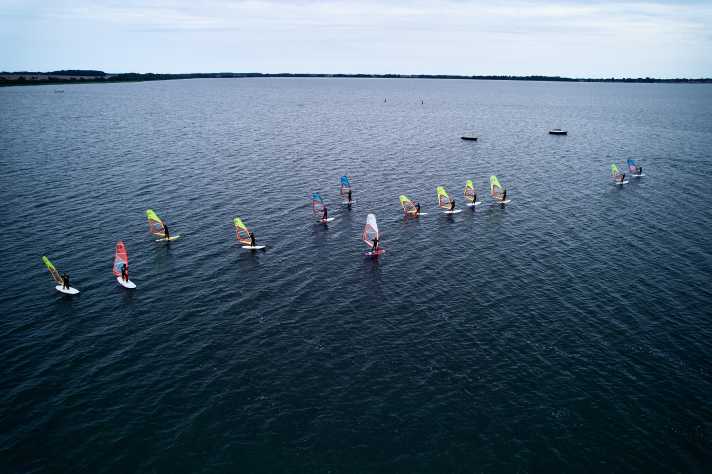
The advanced riders practise their tricks, such as a helitack. The beginners try to ride a small course. They surf downwind, luff up, do a tack and then head back to the starting point. Jana is blown a long way off course by the wind. Even if the manoeuvres are not yet perfect, hardly anyone falls into the water unintentionally. Apart from the children from the surfing course, the usual surfing clientele is out on the water: young men and women, but also whole families in wetsuits. A man paddles himself and his dog across the Wieker Bodden on a SUP with his trouser legs flapping.
Learning what you never thought possible
Surf instructor Andreas Schmidt sits on a bench at a distance and watches Ben and Jannik standing on the pier and fishing. The aim is not to train windsurfers or promote young talent, he says: "Children like Ben learn here that they can do something they never thought possible." Jehor has learnt to foil. The tack works for Jana. Ben lies on his belly on his board in the afternoon, surrounded by a group of giggling beginners, and enjoys the attention. Of course, the surf camp isn't just about surfing.
A group of older boys break out of their rooms at night and visit the girls in their rooms. Close friendships from previous years are put to the test. During the lunch break, racist remarks are made while playing table football and one of Sarah Miron's daughters intervenes. They roast and eat stick bread over the fire: black crust on the outside, raw on the inside. Crickets chirp. As the full moon rises huge and orange over the Wieker Bodden, one of the boys stands sheepishly on the bridge with a girl from the neighbouring village, hand in hand.
More than just surfing
Sarah Miron sits by the fire with the others outside the surf school. "It doesn't always work the way you imagine," she says. Is this worth all the time she has spent on fundraising, advertising, shopping, organising and preparing? This year it was 50 hours before the camp even started. Two girls from difficult family situations, students of Sarah Miron, who she really wanted to have take part, opted out. They didn't get back on the board after the third day. Since then, they have been sitting in front of the camp wrapped in a blanket while the others surf. One of them took a second mobile phone against the rules and bought energy drinks in the supermarket. Because the girl has many other problems, Sarah Miron had a lengthy counselling session with her father in the middle of the week and referred her to the island's family support service. When Ben is bumped into by another boy and injures his leg, he seems close to tears for a moment and says he wants to go home now. But then he sits down by the fire among the others.
Making friends is much easier here than at school. That's why I like the camp so much."
It's just a start
In the early evening, before the fire is lit, there is a rally. Jana runs through the village with her four friends, always leading the way, jumping and skipping through the empty streets. "Why are you all so relaxed, we're under time pressure!" she shouts, "We have to hurry, I just want to win now!" Her friend stops and looks up into the blue summer sky, where five greylag geese are flying. "Look, we're just like them up there!" Whether the camp makes a small contribution to making social injustice less noticeable, at least for the moment, is not a category for Jana, Jehor and Ben.
By the end of the evening, Ben has forgotten the pain in his leg. He would have liked to play a round of table football after the fire instead of having to go to bed. He particularly liked one song: "The beat was a different kind of hard," he says. What counts for Jana is whether she and her friends managed to win the rally. Jehor holds his stick bread over the embers, his face warmly lit by the fire. "Making friends is much easier here than at school. That's why I like the camp so much." It's their summer. And it has only just begun.
Text: Anke Lübbert
Andreas Erbe
Chief editor surf
Andreas was born in 1962 and grew up in Osnabrück. He became passionate about windsurfing as early as 1974, when he learned to tack and jibe at one of the first surf schools on the Baltic Sea. Lake Dümmer became the favorite playground of his youth for him and his friends. In 1988, he joined Surf Magazin as a tester and later editor and was lucky enough to be able to turn his passion into a career. Andreas has been responsible for the magazine's content as editor-in-chief since 2002. His favorite spots are those on the Danish North Sea and Baltic coasts.
